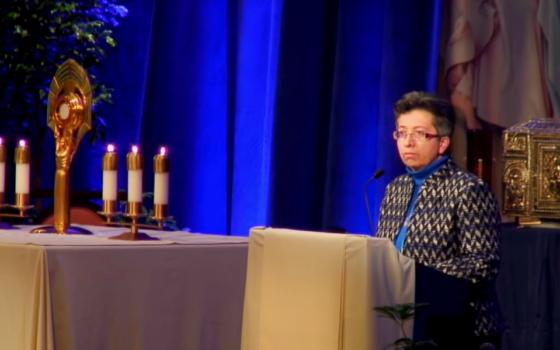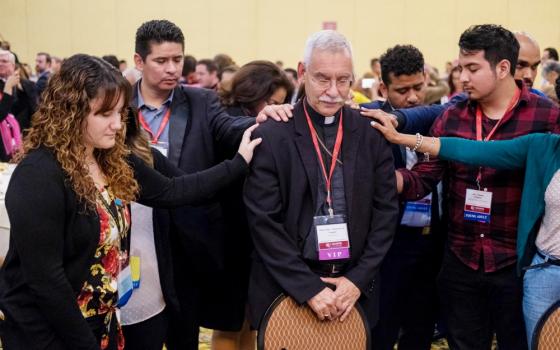A lesson for U.S. bishops lies in an oak tree in San Antonio — one with a healthy exterior but a rotten core unable to sustain its own branches, a core that will cause the slow death of an otherwise beautiful tree.
Contemplating the connection between this tree and the church, Sr. Teresa Maya, past president of the Leadership Conference of Women Religious, offered this cautionary image to the U.S. Catholic Conference of Bishops, whom she addressed on the first day of their Nov. 12-14 general assembly in Baltimore. The bishops convened amid a resurgence of the sex abuse crisis, with the issue front and center at the annual gathering.
Maya, a Sister of Charity of the Incarnate Word, told the bishops that she accepted their "courageous invitation" to speak at their general assembly out of her "deep love of our church."
But she zeroed in on her love for "those who have been hurt by our church, who clamor for a listening heart and our courage to own the truth."
"I am here for all of them. Because, brother bishops, this church, this faithful people, holds so much pain, so many questions, so much grief. For months, I personally have found the words of the creed — one, holy, catholic, apostolic — painful to pronounce. I confess I was even tempted to mount my personal boycott by remaining silent for that part, until something concrete happened. Then I realized: This was my church. And wondered what was mine to do."
Throughout her address, Maya alluded to St. Charles Borromeo, a prominent leader of the Counter Reformation in the 1500s who spearheaded much of the church's reform.
"Literally, the eyes of the people who are in pain for our church, the eyes of every victim of abuse in our church, and everyone else in our society, indeed, the whole world, will now observe" what the U.S. bishops will do next, she said.
"How do we listen to what God is saying to us? I believe this listening needs to happen in communion. God's voice will be heard only when we are together."
"As difficult as coming to this meeting was, as contradictory as your opinions have often been, first you must become one."
"Just as I pray that you will have the courage to remain together and hold the ambiguity, I pray that you notice your family, the church," Maya continued.
"You shepherd one of the most diverse and most gifted churches in the world. You need the diversity of skill, talent and insight gathered around this table of communion. This may be the grace of this moment, the actual need to turn to the lay men and women who can lead through this time. The grace to turn to our Catholic universities to help us find the brave questions we need to be asking; the Catholic hospitals, to help us understand how to treat victims of abuse with respect and reverence, restoring their human dignity."
Emphasizing the need to embrace "synodality," Maya noted that those who participated in the Synod of Bishops on young people in October challenged the church to be more inclusive. "I pray for a deep capacity to listen to the heart of our people, the reverence to listen to a victim's story in such a way that in our listening they may become survivors — their truth owned, their dignity restored."
She offered the bishops wisdom of women religious on leadership from the past few years, having been "tried and tested in many ways," sometimes by despair, misunderstandings and controversy, or losing their sense of accomplishment.
"No, we are not what we used to be. And it took us years to find God's grace in this transformation," Maya said. "For every dark time we had to navigate, we learned something new about our call and our faithful God.
"First, we are still learning that the only way to face any crisis is together, in communion, as sisters to one another. ... We find that what holds us together is always deeper than what sets us apart."
"Second, we are still learning that times of crises call us to lean into our core identity," she continued. "Every challenge has made us articulate ever more faithfully what our discipleship of Jesus Christ means, allowing us to discern what we need to let go of and what we must care for that is most precious. We are learning that our encounter with God deepens the roots that will hold us through the strong winds of every storm.
"And finally, we are learning to cultivate a listening, contemplative heart. Without a deep spiritual life held in communion with our sisters, we lack the humility to discern the good from the bad spirits. We lack the authenticity to identify God's deeper desires and we lack the courage to remain at the table."
Despite loss and grief, women religious have been able to remain faithful through every crisis through God's mercy and their willingness to listen, Maya said.
Outside her generalate's office in San Antonio is the oak tree with the rotten core, the infection having found its way through wounds in the bark, she said. "I stood there for a long time, wondering what nature was telling me."
"I pray for you because women religious have had our share of structures that lost their core and therefore could not sustain our life," Maya said. "Every time our ministries or communities failed to nourish the core, when we found false security in our ministerial achievements, or in numbers of all kind, we learned we had to dismantle the structure.
"I wonder what the metaphor of this tree will mean to your task as leaders of our church. Could it be that some of our structures are no longer relevant in a renewing and vibrant church? Could it be that like my tree, they have run their course? Could it be that we must recognize our failure to care for the core, and now we need to trust a new tree will grow with God's grace?
"The time has come to cut down the trees we need to, in order to clear the forest to plant new saplings that will hold the core of the Gospel. I pray that you will have the courage to take down any structure with a rotten core, and to plant the seedlings that will take time to grow," she said.
Maya said she prays that the bishops go back to a time "before allegations, accusations, declarations, before the mistakes and the litigations. ... Can you be the men of honor that you were anointed to be?"
Though they've made serious mistakes and have serious decisions ahead, she said, they are "still those men who were anointed that day," of "one mind and heart with the Holy See.
"But you should not expect the Vatican to resolve what is yours to resolve. The Vatican does not have the knowledge, resources and gifts that you do. You can be models for the rest of the world. I urge you to seize this opportunity.
Maya encouraged that the bishops listen to one another to figure out how the "inspiration of the Spirit" has already been at work among them. "Turn to your brother bishops who have had the courage to listen to survivors, to begin exploring new structures, to own the historical responsibility of the institution they represent, who have collaborated with law enforcement and have embraced the vulnerability of transparency."
Recollecting the bishops' dinner with the youth at the V Encuentro (a national gathering of Hispanic Catholics), Maya closed her address with the memory of youth participants blessing the bishops at the event. "I was moved to see how vulnerable you felt to all of us."
But she wondered why, despite all the negative media coverage, the Latino community was still so encouraging of their bishops.
They told her, "Sister, we know what has happened. But we're still family."
"Those young men and women had a lot to say that night," she said of the dinner. "They were not afraid to speak the truth. But they did so with great respect because, they said at my table, we love our church. And you listened."
"At the Encuentro, I learned that to get the blessing, first you must show up," she said. "You must be willing to enter into the culture of encounter.
"Second, you need to remain there without an agenda, with an openness to surprise, to the unexpected. In short, you need to become vulnerable in the midst of our church, just as you were at the Encuentro: one among many."
"And third, you have to listen, without interruption, like you've done today, with intent, with appreciation, like you did that night. Then, you will receive the blessing to go forth and do what you must. You can do it again. You can do it again."
[Soli Salgado is a staff writer for Global Sisters Report. Her email address is ssalgado@ncronline.org. Follow her on Twitter: @soli_salgado.]



